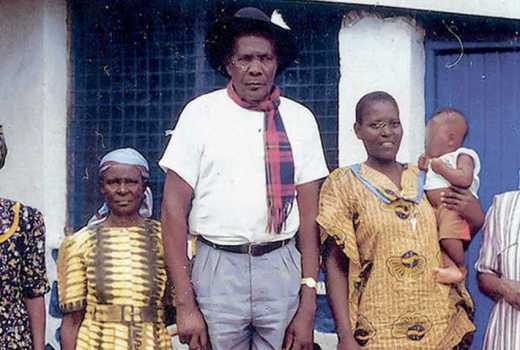
For many who knew him during his lifetime, the name Acentus Akuku ‘Danger’ is synonymous to polygamy.
Call him the grandmaster of seduction if you must because he was Kenya’s most prominent polygamist and is reported to have married more than 100 women in his lifetime and fathered over 200 children.
The rise of “Danger”
Born Acentus Ogwella Akuku, he married his first wife in 1939. At the age of 22, he had married five wives and by the time he was 35, he was on his 45th wife.
His love for polygamy and women earned him the nickname ‘Danger’ from his peers who believed that his every move was made to attract women.
“I’m called Danger because I overshadowed many men when it came to women. I was very handsome. I dressed well and I knew how to charm women with sweet talk. No woman could decline my advances. I was a magnet,” Akuku once told The Standard.
Arguably one of the world’s best-known polygamists, he married his last wife in 1992 when he was 79. The woman was then only 18.
His love for polygamy was no longer a family thing but became an industry as he had so many children in his family that he established two elementary schools solely to educate his children, as well as a church for his growing family to attend.
Akuku The Disciplinarian

Despite his large family, he was reputed to be a disciplinarian who ruled his large family with an iron fist. He knew all the children by name and made a roster on when to spend on which house.
In past interviews, Akuku told local journalists he was responsible for naming all of his children, as way to bond with them.
“I lived a lavish lifestyle. I was always ready to spend money on women.”
“I divorced women who misbehaved,” he once said.
Akuku grouped his families in clusters spreading across Ndhiwa, Homa Bay and Migori. His main homestead or ‘State House’ is however in Rachuodho.
As a rule, one family cannot claim the property in another cluster.

In a chat with Daily Nation, one of Akuku’s wives, Damaris Awiti recalled her time with him.
She had gone to visit her sister Priscah Obumba who had just delivered a child. Priscah was the ninth wife but Damaris began to envy her sister for her ‘catch’ and didn’t waste time in accepting Akuku’s proposal when he asked to marry her as well.
“He was a tall and very handsome man. The tone of his voice was very soothing. I found him irresistible. Furthermore, he had enough wealth, which was every woman’s dream at the time,” Damaris told Daily Nation.
On how the household was run, Damaris said:
“He was a very caring man who would make you feel like the luckiest woman on earth. I loved him very much, and he, too, loved us,” recalls Damaris.
“When I joined the family, I was taught how to live and what roles I would play in the home,”
“One wife, for example, would be assigned the duty of cooking for our husband for a given period. Another would iron his clothes… and so on,” explains Damaris. “That way, we avoided chaos.”
Wives without special duties, Damaris said, would accompany the other family members to the farm, where they worked until evening. After farming, Damaris said every woman would go back to her house with her children and cook for them. Akuku would spend the evening with the wife whose responsibility was to cook for him during that period.
“Mzee did not like lazy, proud and arrogant women. He would warn a woman over a misdemeanour and, if she repeated the same mistake, chase her away. All her children sired by Akuku would remain in the family.”
When a woman had been divorced, says Damaris, Akuku would decide which one of his many wives would take care of the children of the expelled wife.
Rise of an Empire?

Many attributed his large family to the fact he was very rich; he owned a fleet of taxis, and most of these cars were driven by his sons.
“In one street trading centre you will see a general store run by one of his sons and a tailor’s run by a daughter,” a BBC report in 2000 said.
Aoro Chuodho market is literally Akuku’s empire. Half of the shops and residential buildings are his and his family members. Most of the buildings have names like Akuku Danger Plaza, Akuku Tailoring shop, Akuku Shop, P Akuku Complex …Akuku This and Akuku That.
Special Diet
For those wondering where he got the energy to run his household, Akuku himself admitted he never forgot to cater to his own health as he followed a strict diet.
“I avoid too much fat and salt and it helped me to escape diseases,” he said. “I eat at the right time and I just don’t eat anything. I am served traditional food that is well prepared. I always eat a fruit after meals.”
Towards the end of his life, Akuku started charging fees for media interviews. Journalists and tourists who trooped to his main home in Ndhiwa District had to pay ‘fees.’
Akuku Goes Home…
He died in October 2010 at the age of 92 and reports said he outlived 12 of his wives.
Akuku collapsed at one of his homes in Ndhiwa and died on arrival at the Nyanza Provincial Hospital at 2 am. He was suffering from diabetes.
The family spokesman, Mr Tom Akuku, however, said only 40 of his father’s many marriages were recognised by the Luo customary laws. He said that out of the 40 wives, only 22 were still alive.
“Mzee sired 210 children–104 daughters and 106 sons, some of whom have since died,” Tom Akuku said at the time of Akuku’s death.
…But His Legacy Lives On

It is reported that Akuku held regular night meetings with his family. This tradition did not end with his death. His family still gets together at ‘State House’ to address any problems and discuss matters affecting them.
They have a common kitty, where all income is collected and distributed. Most of the funds are for school-going children and Akuku’s orphans, a family spokesman said.
Grandson Nickson Mwanzo says the Akuku clan is using Facebook to bond with each other. The grandchildren are setting up the Akuku Danger Family Facebook page in honour of their grandfather.
“We are so many that it is hard for us to meet in one gathering, so we set up a Facebook page to track Akuku’s lineage,” says Mwanzo.
To his surprise, they got responses from all over the world.
His sons and grandchildren are well educated and work in the civil service and the private sector.
“He has been our advisor and guardian,” said Dorcas Matunga, the Homa Bay County Council Chairperson and one of the late Akuku’s daughters-in-law.
Following his death, there have been comparisons between Akuku and other successful polygamists from the African continent. Names like eSwatini’s King Mswati III, who has about 14 wives and 23 children, have come up. South Africa’s former President Jacob Zuma is also noted to have five wives and 20 children.
But perhaps the one who comes close to Akuku is Abumbi II, the 11th king of the Bafut kingdom in north-west Cameroon.
The king has 100 wives and 500 children. The only exception is that he inherited 72 wives from his father, King Achirimbi II, who died in 1968. With 28 wives already, King Abumbi ended up with 100 queens and 500 children.
However, those who knew Akuku agree that if ever there would be an award for a successful polygamist, Akuku would get the gold.
As Kenyans often say of a departed fellow, ‘Danger’ has left a gap that will be difficult to fill because many men have failed the test of seduction, leave alone polygamy.
Kindly contact us @ Naijalivetv@gmail.com
Call or Whatsapp: 07035262029, 07016666694, 08129340000










